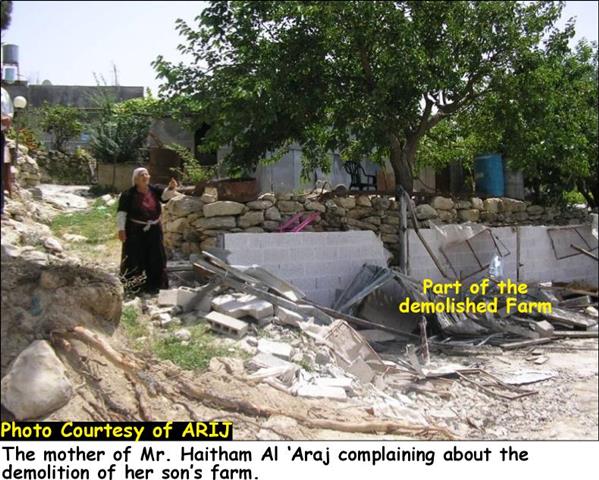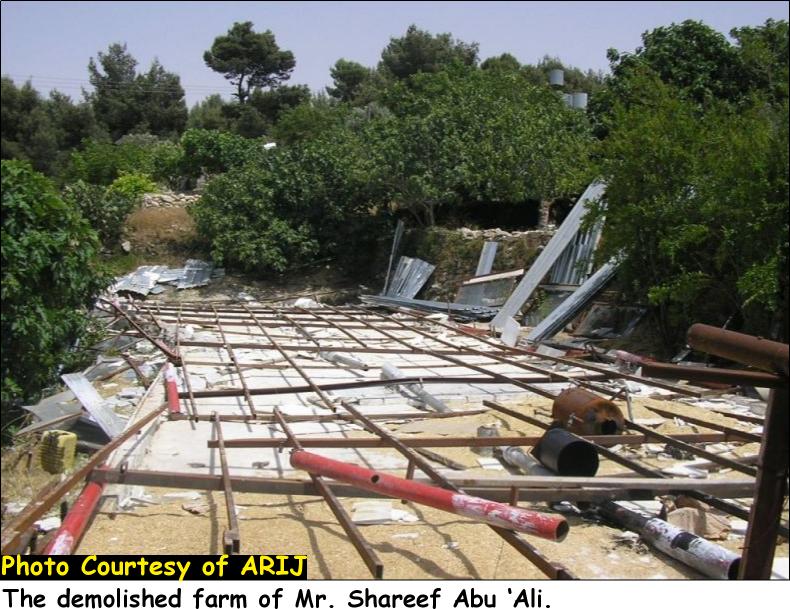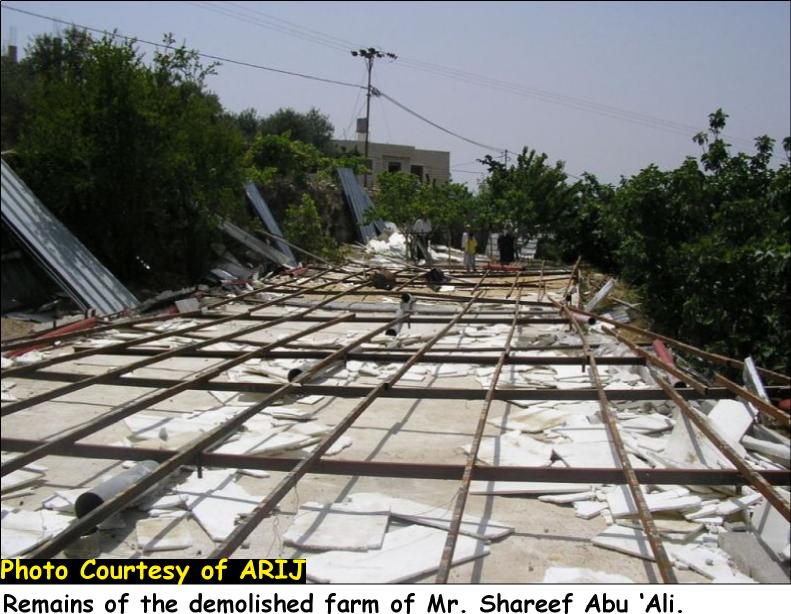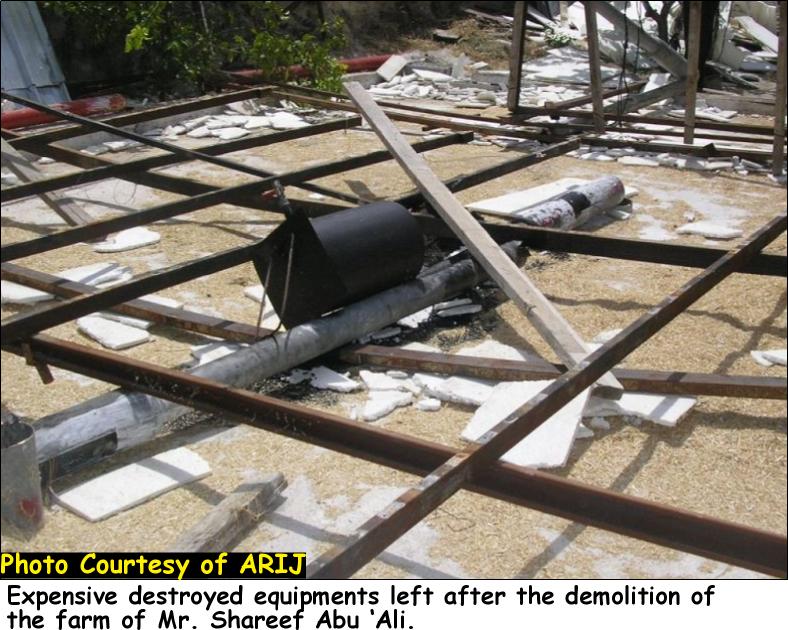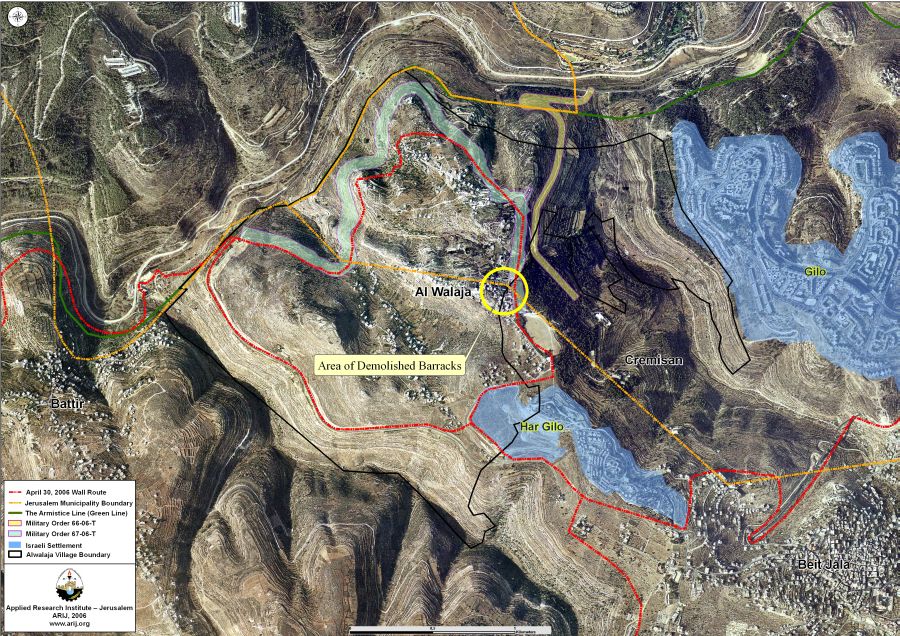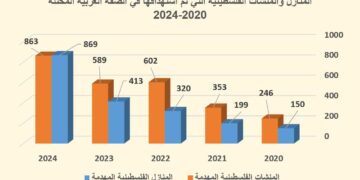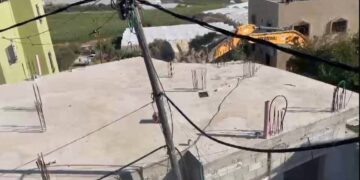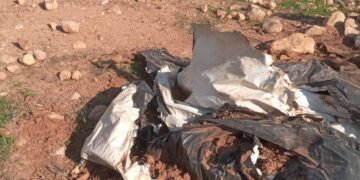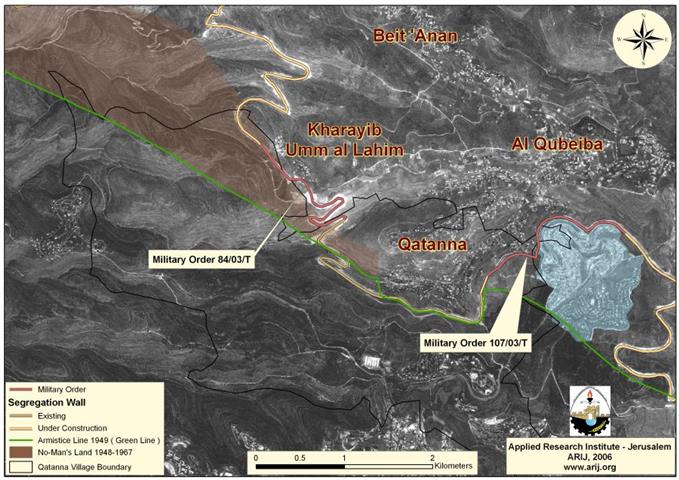Following the occupation of the West Bank, including East Jerusalem, and the Gaza Strip in 1967, thousands of Palestinian houses have been demolished for various Israeli purposes, either for being unlicensed, or due to their location close to a military bases, a settlement or a military road, etc.. A study conducted by the Israeli Committee against house demolition showed that since that period (1967 up to today, more than 12000 Palestinian houses were demolished in the West Bank including East Jerusalem. Consequently, such demolitions caused thousands of Palestinian families to become homeless and seeking refugee somewhere else, at their relatives, neighbors or even living in tents. Families, in most cases, weren't given time to salvage their properties and so seeing the bulldozers demolish their houses and the furniture still in the house. Other Palestinian families were only given little time (ranging between 15 to 30 minutes) to salvage whatever possible from their houses and so had their furniture destroyed along with the demolition process. Other Palestinian families witnessed their possessions being thrown in the streets by the workers who accompany the Israeli bulldozers carrying out the demolitions. Other Palestinian houses were demolished while still under construction (uninhabited) and have been the fruit of years of hardworking and savings. Demolition campaigns not only included houses, but also included agricultural houses, sheep and poultry farms which constituted a major income to many Palestinian families.
Demolitions carried out at Al Walajeh Village
The Israeli bulldozers backed by Israeli police jeeps staged into the village of Al Walajeh on the 28th of May, and demolished two poultry farms owned by Haitham Mustafa Khalil Al 'Araj and Shareef Ibrahim Hussein Abu 'Ali for being unlicensed.
The farm of Mr. Haitham was built in 2002 in an area very close to his house and to the border of the illegally redrawn Jerusalem Municipal boundary. The farm occupied an area of 200 m² and was a house to 2000 chickens (10 chickens per 10 m²) which constituted the major income to the family.
Three days before the demolition of the farm, the Israeli Civil Administration for Judea and Samaria handed Mr. Haitham military order number 13368 indicating that the construction was built in violation to the Law number 79 of 1966 concerning Planning of Towns, Villages and Buildings. The order includes a final notification to stop the construction and demolish it. The order also gave the owner a three-day period, from the date they handed him the order, to object to the demolition.
Amendment to law 79 of 1966:
|
In Year 1971, the Israeli authorities 'amended' Law number 79 by Military Order number 418, under which all significant decisions on permits and plans would be made by a High Planning Council appointed by the Military Commander. MO 418 also allowed the High Planning Council to prepare, amend, cancel, disregard, or dispense any plan or permit; it also had the authority to exempt persons from obtaining the necessary license. Most members of the High Planning Council have been military officers and all have been Israeli citizens. |
The amendment to this law has advanced the establishment and the expansion of Israeli settlements and while prohibiting the natural development of the Palestinian society simply by rejecting permits and demolishing Palestinian houses built without licenses.
Mr. Haitham's farm was built without a license due to complications imposed by the Israeli Civil Administration and its application of military order number 418 on Palestinians who are applying to get a license whether for building houses, constructing agricultural houses or poultry farms.
This status has forced Mr. Haitham to build his poultry farm without a license due to life needs, especially following the eruption of the second Intifada in September 2002 when he lost his job as a constructional worker inside Israel and started to look for an alternative to support his family. Not forgetting to mention that Mr. Haitham is a father to 4 kids in addition to his parents and his brother who also lives with him in the same house.
Soon after he received the military order, Mr. Haitham began preparing the documents needed to object the demolition process and to apply for a license for his farm in an attempt to save it from being demolished. On the third day of the period that was given to him to object to the demolition order, the farm was demolished. Mr. Haitham has spent about 50 thousand NIS (11 Thousand dollars) on his farm and not only lost his lone source of income, but was left with debt. See Photo 1 & Photo 2
While the farm of Mr. Shareef Ibrahim Hussein Abu 'Ali has an area of 220 m² and was a house to 3000 chickens. Mr. Shareef built the barracks in summer of 2004 at a cost of 16 thousand dollars. Months after he built the farm, he received a military warning (On September 27, 2004) from the Israeli Civil Administration for Judea and Samaria (ICA) which stated that Mr. Shareef should halt constructions in his farm. Soon after he received the warning, Mr. Shareef tried to issue a license for his farm by applying the required documents to the ICA. From that time and until few days before the demolition took place, Mr. Shareef received nothing from the ICA. On the 23rd of May, Mr. Shareef again received a military order which stated the demolition of his farm in three days if he doesn't object to the demolition order. Mr. Shareef again sought to present his documents to the ICA, but with no avail as the Israeli bulldozers rushed to the site and demolished his farm. See Photo 3 & Photo 4 & Photo 5
Demolition carried out under the pretext of being Unlicensed
People of Al Walajeh declared that the demolition campaigns taking place in the village are carried out under the pretext of being unlicensed and not complying with Israeli laws, while the real aim behind the demolitions is due to the construction of the Segregation Wall in the village. See Map 1
In addition to constructing the wall, the IDF (Israeli Defense Forces) issued military orders in September 2004 stating the creation of a buffer zone averaging 150-200 meters on the Palestinian side of the Segregation Zone where new construction is prohibited. An area of 252 km² of the West Bank (4.4 %) will become out of commission. Since that date and until today, many Palestinians received demolition orders or had their houses demolished due to the fact that their properties (houses/farms/agricultural houses …etc) are located very close to the Segregation Wall or in another meaning, in the area where the buffer zone is lined up to be created.
The two farms of Mr.Haitham and Mr. Shareef are located in an area very close to the route of the Israeli Segregation Wall (or in the area of the buffer zone Israeli plans to create) which is planned to be constructed in the village.
The Israeli Segregation Wall in Al Walajeh Village
The Wall route in Al Walajeh village has been subjected to several changes before it comes to the latest update which was issued on April 30, 2006 by the Israeli Ministry of Defense on its website and showed that the village of Al Walajeh will be put in an enclave, as a 6 kilometers Wall will surround it completely, from all directions, and will cause the confiscation of 1980 dunums of its lands (1.980 km²), 45 % of the village's total area which is 4403 dunums (4.403 km²). See Map
References:-
-
Halabi, Usama (1997). Planning and Zoning. Retrieved June 17, 2006, from Bir Zeit University – Institute of Law Web site: http://lawcenter.birzeit.edu/publications/plan.html.
-
(December 8, 1999). ISRAEL AND THE OCCUPIED TERRITORIES – Demolition and dispossession: the destruction of Palestinian homes. Retrieved June 17, 2006, from Amnesty International Web site: http://web.amnesty.org/library/Index/engMDE150591999..
Related cases
-
New Wall changes confiscate more lands from Al Walajeh Village! 11,May,2006
-
State Vandalism: Israel Disrupts Nature in Al-Walajeh Village, 16,April,2005
-
Inhabitants of 'Ein Al Juweza village seeking refugee, 01,March,2006
-
Al-Walajeh Devastated by Israeli Bulldozers, 18,January,2005
Prepared by
The Applied Research Institute – Jerusalem
ARIJ


